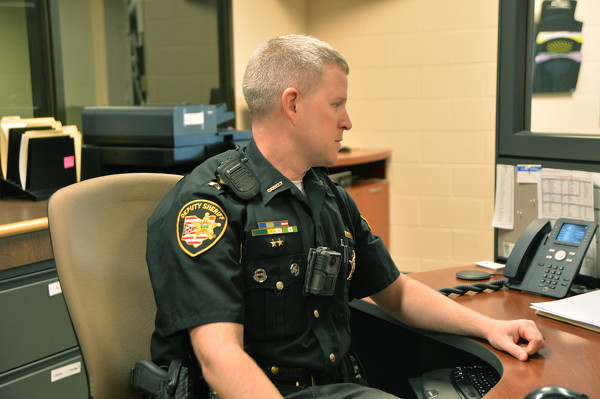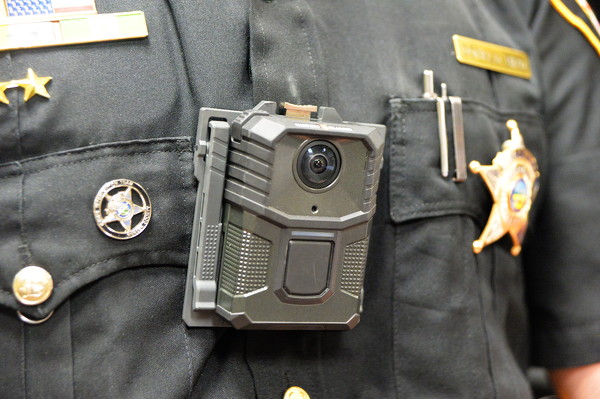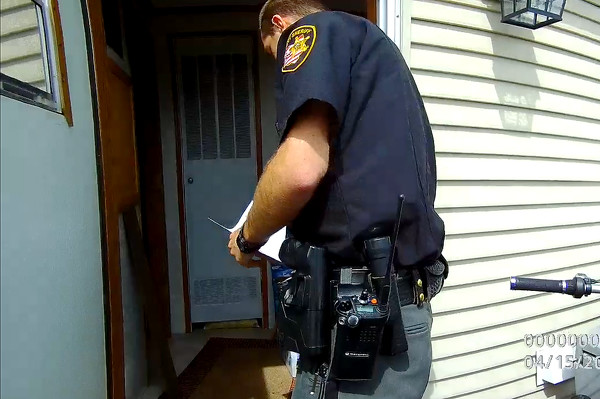Saturday, April 23rd, 2022
Deputies getting body cameras
$43,767 state grant will help sheriff's office buy 29 units
By William Kincaid

Photo by Paige Sutter/The Daily Standard
Sergeant Don Bird sits at his desk with a body camera attached to his chest at the Mercer County Jail in Celina Friday morning.
CELINA - Mercer County Sheriff Jeff Grey will use a mix of state grant dollars and other funds to finish the job of equipping all officers who deal with inmates or have arresting powers with body cameras.
Grey plans to purchase 29 body cameras, 20 of which will be issued by corrections officers in the jail and nine by detectives assigned to the courthouse or prison transport.
His office will spend $100,536 on the cameras and ancillary software and computer storage for recordings. It will be paid for with a $43,767 grant awarded by the Ohio Office of Criminal Justice Services, $36,869 in payments for housing prisoners from other counties and $19,000 from jail commissary profits.
"Not tapping into the general fund and not tapping into sales tax money for the jail," Grey noted. "Almost $37,000 of it's being paid for by other counties for us holding their prisoners and then almost $20,000 of it … is being paid for basically by prisoners."
Once the new body cameras arrive, all officers who make arrests or deal with inmates will have them.
"I think it's very unique," Grey said of a rural law enforcement agency having officers equipped with body cameras, which he said are increasingly considered an indispensable tool. "The public expects us to be able to play the video for them instead of just telling them what happened."
More and more body cameras are worn by corrections officers in jails and prisons, Grey noted.
"The jails have a lot of cameras in them anyway. The cameras that are in the (county) jail, we can't hear the conversation and now we'll be able to hear what's going on when the correction officers turn on the body cameras," he said. "Sometimes inmates accuse corrections officers of saying things and occasionally there are things that happen in the jail … and we don't have a good camera angle from the mounted cameras."
Body cameras don't capture everything but they do a pretty good job and offer a second layer of video documentation, Grey said. Patrol deputies began wearing body cameras in 2015.
"When we do have a complaint about a deputy we can look and see what happens. I think it's helped with professionalism because deputies know they're being recorded," Grey said. "People have started to understand that we have the body cameras so our complaints have went down."

Photo by Paige Sutter/The Daily Standard
A close-up of a body camera.
The department's quality assurance program finds supervisors conducting monthly random reviews of body camera footage to evaluate officers' interactions with people.
"It helps us make sure we're treating the public the way they should be treated," he said.
Just as importantly, supervisors evaluate officers' tactical maneuvers, making sure they're not letting their guard down and carrying out procedures correctly, Grey said. Videos illustrating both proper and improper tactics are used for training.
The Auglaize County Sheriff's Office was awarded $67,530 through the same state program, according to a news release from Gov. Mike DeWine.
Sheriff Mike Vorhees said his office's share of money will go toward buying body cameras for patrol officers.
Vorhees said he sees the new technology as a way to help his officers put together better cases.
"There may be something you miss by the naked eye that you can see in the footage that helps investigators," he said. "Since I took office last January, we have been preparing for this, although at the time the money wasn't there, so the grant is a start."
Vorhees said cameras are already installed in deputies' patrol cars. His department has a computer server that will be be used for the cameras in patrol cars and the new body cameras.
DeWine awarded more than $4.7 million to 109 law enforcement agencies. Of the 109 local law enforcement agencies receiving grants, 49 will use funding to create new body-worn camera programs. The other 60 agencies will dedicate funding toward expanding or upgrading existing technology, according to the release.
"Body cameras have quickly become a necessary tool for modern policing," DeWine said in the release. "With these grants, more than four dozen law enforcement agencies that have never had body cameras before will be able to invest in this technology to help protect their officers and offer transparency to the public."
In total, the funds will help agencies purchase around 1,700 new body cameras and computer equipment, software, video storage and other items according to the release.

Submitted Photo
This screenshot of footage from Deputy Kyle Fink's body camera shows Deputy Douglas Wuebker entering a home for a search on April 15.





